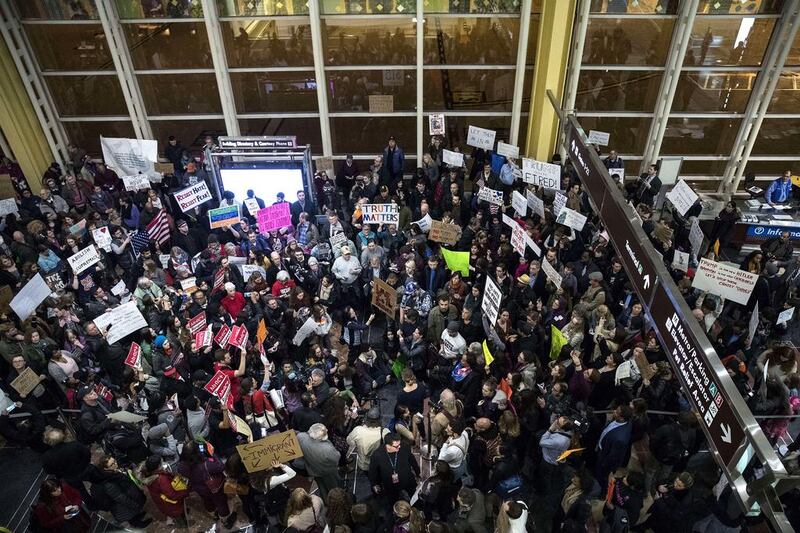With a stroke of the pen on a misdirected and malicious executive order, Donald Trump has unleashed a dynamic that will have consequences as far-reaching as the Bush administration’s wrong-headed response to the September 11 , 2001 terror attacks.
What the order has done is deepen Arab popular anger at the United States, provide ISIL with a public relations gift and fuel Islamophobic fear in the US, while, at the same time, exacerbating sectarian tensions within the Arab community.
Suspending and placing restrictions on immigration and refugees from seven mostly Arab and Muslim-majority countries will not make America safer. The data is clear. Immigrants from the countries on the White House list have not posed a threat to the US. Those who have been excluded are largely students, family members visiting relatives or business people.
What the order has, in fact, done is cancel the visas of up to 100,000 individuals. It has also resulted in a nightmare situation for hundreds of innocents caught on the cusp of the order’s implementation, who were detained at airports, interrogated, and, in some instances, sent back to their countries of origin. This has produced deeply moving stories of separated families, broken promises, shattered dreams and personal hurt that have intensified anti-American sentiment.
After 9/11, in stark contrast to the widely held view that “Arabs hate American values”, Zogby Research Services polling made clear that Arabs respected the US, its culture, its openness, its tolerance and the promise of its democracy. What they resented was US policy towards them. As one respondent noted: “I love America. I just feel that America doesn’t love me.”
Despite America’s devastating war in Iraq, its anti-Palestinian bias and its other failed policies across the region, what continued to hold hope for Arabs was that some day America would be true to its stated values. Mr Trump’s executive order and the anti-Muslim rhetoric that accompanied it have shattered that hope. ISIL must be pleased.
The administration’s claim that the executive order is not “a Muslim ban” doesn’t pass the smell test. Granted that the freeze only includes seven countries, but the rhetoric has clearly been inspired by the anti-Muslim animus of a White House populated by a group with individuals with a long record of Islamophobia. The language they have used to make the case for the order has been taken directly from the writings of well-known Islamophobes. In any case, this is how Mr Trump’s supporters have been encouraged to understand the order’s intent. Added to this are stories circulating that the list will soon be expanded to include many more Muslim-majority countries, among them Lebanon, Egypt and Pakistan.
Making matters worse, the administration has coupled its freeze of the refugee programme with the caveat that, in the future, priority status will be given to “persecuted minorities” – by which they have meant Christians. Mr Trump has justified this arguing that during the Obama years it was “very difficult for Christians” to get refugee status to come to America. This is a patently false claim that has been frequently made by far-right ideologues. In reality, the number of Christian and Muslim refugees entering the US each year are roughly the same. The percentage of Iraqis admitted in the refugee programme already includes a very large number of Iraqi Christians. And while the numbers of Syrian Christians admitted as refugees was quite low, it can be shown that this is due to the fact that most Syrian Christians are not refugees. Many, however, have come to America, either as asylum seekers or under other visa programmes.
Nevertheless, this administration’s stated preference for Christians has only served to reinforce the notion that the executive order was anti-Muslim, while exacerbating sectarian tensions within the Arab community. Having worked for decades to overcome religious divides, Arab Americans have had to face down many challenges to their unity. Recent immigrants still bearing wounds from their countries of origin have been the most vulnerable. In this context, an administration-led anti-Muslim bias has taken a toll. Added to this, recent news articles quoting some immigrant Syrian Christians and some Arab American Republicans expressing support for Mr Trump’s executive order have been hurtful.
The fallout will continue. The partisan and sectarian divide it has fostered, the extremism it has fuelled and the damage it has done to America’s image will be with us for a long time. Far from making the US safer, this administration is putting it at greater risk.
ISIL is, no doubt, an evil movement that must be defeated. But, in reality, this group has never posed an existential threat to the United States. It could never do as much damage to the very idea of America and to the values to which Americans aspire as the foolish and dangerous policies put forward by this administration.
Dr James Zogby is president of the Arab American Institute
On Twitter: @aaiusa





